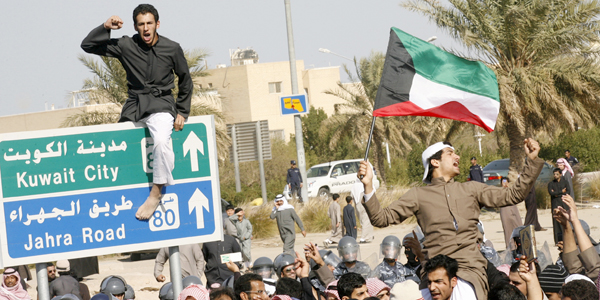Stateless Arabs, known as bidoons, protest to demand rights in Jahra City, 50 kms of Kuwait City, on February 18, 2011. AFP PHOTO/YASSER AL-ZAYYAT
4th April 2022
The state of Kuwait has for a long time been considered a pioneer in safeguarding Human Rights and freedoms – somewhat of a progressive oddity among its neighbours in the Gulf. The country was indeed the first Gulf nation to ratify the International Convention against Torture and Other Cruel, Inhuman or Degrading Treatment or Punishment (CAT) in 1996, as well as the only country allowing for elections and political opposition. Yet, while this façade of compliance to international Human Rights commitments may reassure trading partners and investors, the human rights situation in the country is not as optimistic as national media agencies and governmental authorities want to portray it. In response to the 2011 wave of pro-democratic uprising threatening dictatorships and autocracies in the Arab world, the Emir Nawaf Al-Ahmad Al-Jaber Al-Sabah and his government bolstered the repression of civil society and dissidents. Since then, torture has been one of the various means adopted by the authorities to silence, imprison and punish those who dared fight for their freedoms. As in various neighbouring countries, victims’ demands for accountability and reparation are confronted with a widespread culture of impunity, in fact, the state’s brutal use of violence perdures unpunished.
In the latest Amnesty International assessment on the Human Rights situation in Kuwait, the organisation denounced the persecution of dissidents and activists. In addition, in the last few years, several civil society and international organisations have reported cases of use of torture by the Kuwait security forces against minorities and activists. Most recently, in November last year, 11 individuals were arbitrarily arrested by the State Security Bureau. They were later subjected to ill-treatment, deprivation of sleep, physical abuse, and threats of torture during detention and interrogations. The physical and psychological scars of these abuses still affect the health of the 11 men, who are mostly elderly. The confessions obtained were then considered legitimate and used against the victims.
Both Kuwaiti citizens and noncitizens face the government’s repressive measures. In particular, activists fighting for the recognition of Bidoons’ fundamental rights have been targeted for their advocacy. The precarious and stateless situation in which the country’s Bidoon community is relegated is one of the main internal issues of the country. Bidoons are denied citizenship, access to services and to the country’s political life. Various public protests have been organised to denounce Bidoons’ statelessness and ask the government to guarantee their fundamental rights. In February and March 2014, leading Bidoon activists were arrested and detained for their participation in organising these protests. They were allegedly tortured while detained. In 2020, the US Department of State reported that “there are credible indications that police, KSS force members, and the Ministry of Interior’s Drug Enforcement General Directorate abused prisoners during arrest or interrogation”.
Many activists have demanded reparation for the ill-treatment suffered, yet demands for accountability are disregarded, especially when the victims are from the Bidoon community. Indeed, the Public Prosecutor has repeatedly refused to investigate torture accusations from Bidoon activists and has failed to transfer their cases to the Forensic Medicine Department.
Apart from Kuwait’s ratification of the CAT Convention in 1996, this apparent commitment to the prohibition of torture is evident in the country’s Constitution and national legislation as well. Kuwait has also apparently taken measures to protect individuals from torture, such as installing cameras in all places of detention, and training officials in the field of human rights. However, upon further investigation, the law is inconsistent in its prohibition of torture. Particularly worrying is article 37 of the Code of Criminal Procedure which proclaims that “any means can be used for the preliminary investigation as long as it does not contravene public morals, liberty and freedoms of the individual”. While it does not explicitly allow torture, the choice of the expression “any means” is extremely vague and open to great interpretation by mal-intentioned authorities.
The national legislation (Article 70 of the Kuwaiti Criminal Code (Act No. 16 of 1960), Article 53 and 56 of the National Security Law No. 31/1970) also provides for extremely light sentences for officials who are found guilty of torture, ranging from around 5 years maximum and at minimum simply a fine or suspension from their position. This disproportionate sentencing is a result of the law considering the act of torture as an offense, punishable by disciplinary actions, rather than a crime. Harsher sentences are only available if the torture amounts to another crime (murder, assault, etc.), which results in almost complete impunity for acts of torture which involve solely psychological harm. These sanctions are a world away from the CAT recommendation to set prison sentences for torture between 6 and 20 years. On top of this, officials are rarely prosecuted for allegations of torture in the first place.
It is evident through various allegations of torture reported by international organisations and through the gaps in protections in national legislation that Kuwait is not respecting its obligations according to the CAT. The international community has a responsibility to denounce these failures and ensure respect for the international treaties that Kuwait has ratified. Kuwait underwent a periodic review under the CAT in 2016, during which civil society organisations and the Committee expressed their concern about the continued widespread allegations of torture in detention as well as the lack of appropriate and efficient mechanisms for prosecution and compensation for victims. Kuwait must amend its legislation to appropriately define torture in accordance with Article 1 of the CAT and must implement measures to prosecute officials who commit torture in order to eradicate this pervasive culture of impunity in the country.

